Welcome to week two, online guide to everything HtTAJwBTG. We will begin with week two’s presentation notes, and then at the bottom I will provide a few links for further study. Hope to see you join us in person next week!

Thank you for joining us for week two. We will begin by reviewing last week’s content.
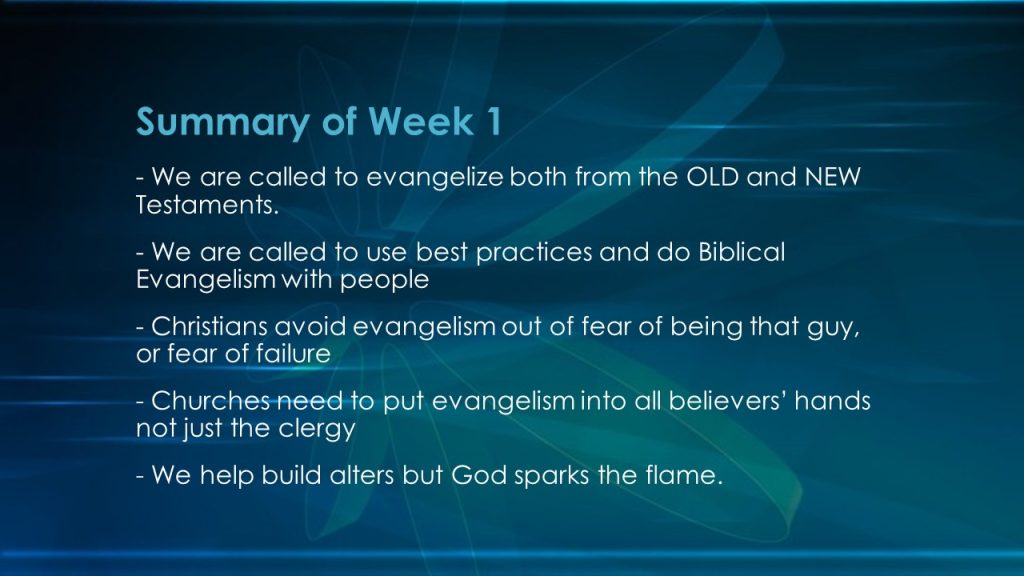
As you can see from the image above, we learned a lot in week one. Let us also now remind ourself of the question set put forth last week which we should keep in the back of our minds throughout this entire course.
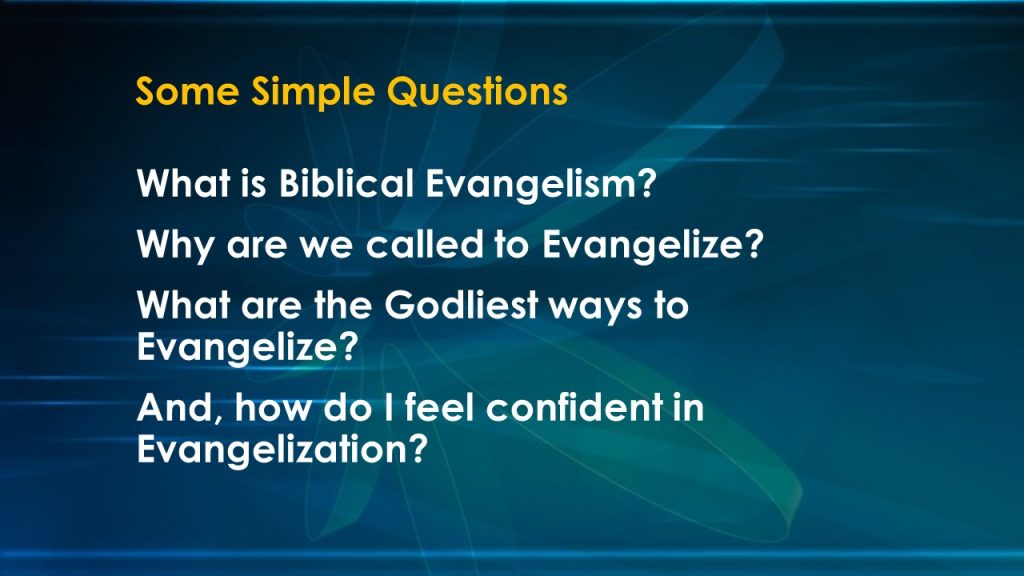
I hope that after last week, you have a better appreciation for the fact that God calls us through the scriptures, through history, through Jesus’ teachings, and by the Spirit to continue to share the Gospel every day. Now we just have to get a better understanding of what a health evangelism looks like.
Let’s begin by looking at a fun picture I found online.
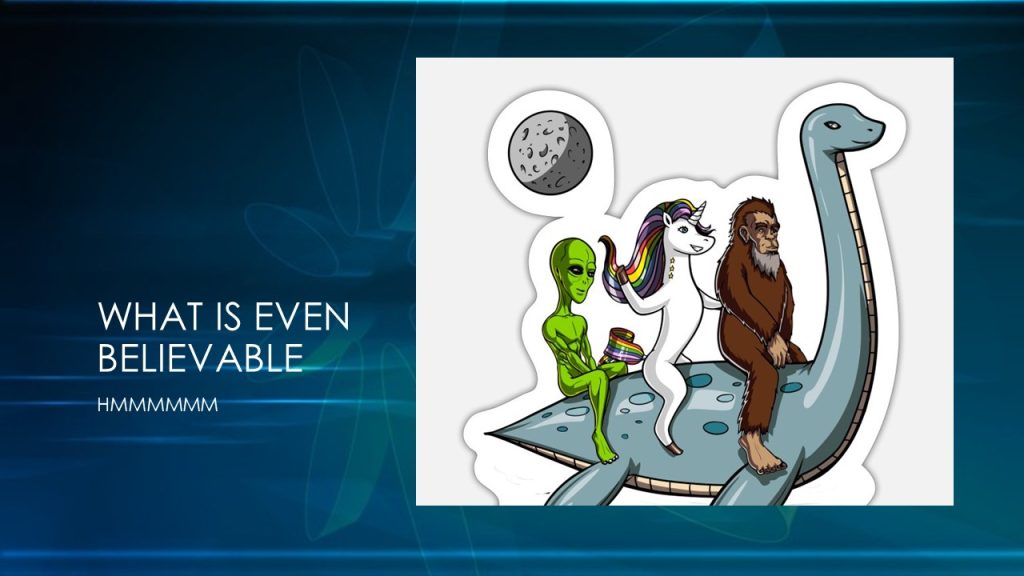
Today the hinge of our discussion is, why do people believe what they do?
People believe in all sorts of things that are hard to prove, some beliefs we call myths, other religions, others theories, and others facts.
Let’s play a game, who here believes aliens might exist?
Who believes that unicorns might exist?
How about Bigfoot?
The Lockness Monster?
and who thought the moon landing was staged?
When you ask people what they believe, especially in a room full of people, there is a social alert that happens because belief has real-world ramifications. This is why people shy away from belief, and many people who wish to talk about it are shunned. In a way there is a safety-feel we get when we run from talking about belief.
Belief can also be hard to articulate between world views. For example here is how many Christians would see atheism.
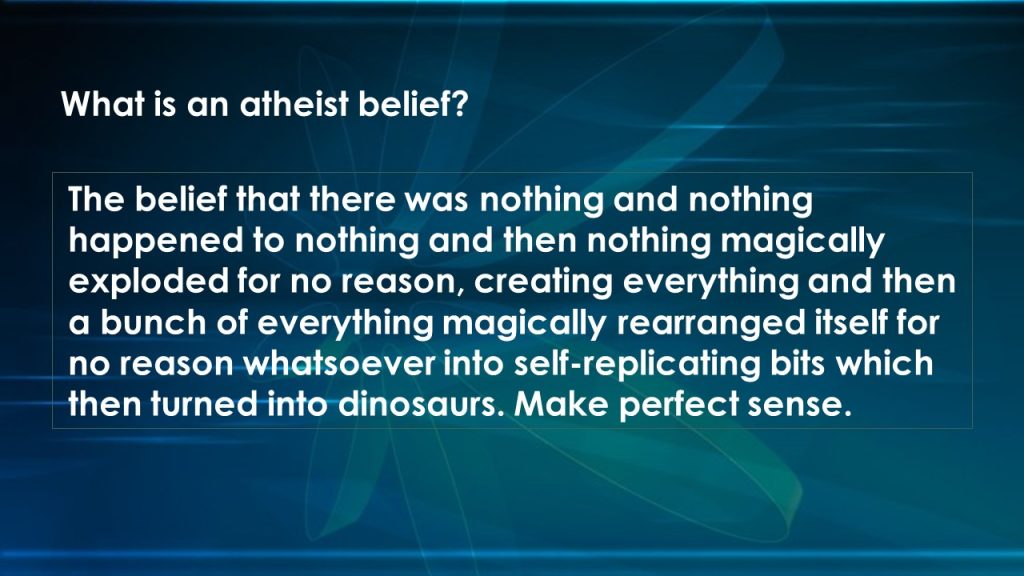
When you talk about atheism that way it sounds rather ridiculous….
But we can also talk about Christianity in this way…

Now, I did not make up these definitions of Atheism and Christianity, these are definitions pulled from MEMEs found online on Facebook. But it goes to show you belief is complicated, just because you believe and understand in one way for this set of reasons, doesn’t mean other will too.
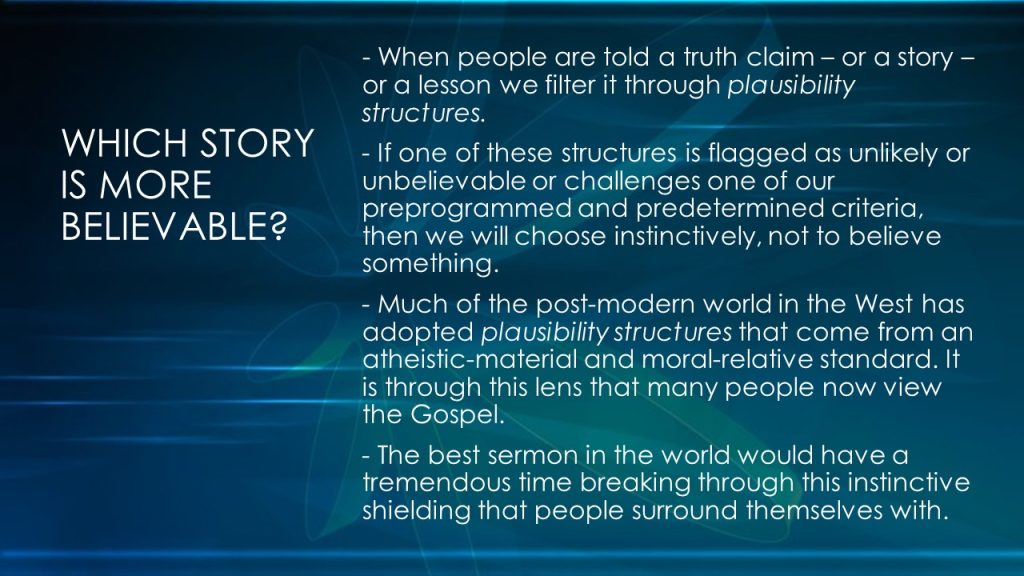
In Chan’s book, he contrasts the story of alien abduction with the story of the resurrection and asks which is more believable. And then asks how people decide what is believable.
When people are told a truth claim, or a story, or a lesson, we filter it through plausibility structures. It like a coffee filter, only letting some stuff through. If one of these structures flags something as unlikely or unbelievable or something challenges one of our preprogrammed and predetermined criteria, then we will choose instinctively, not to believe something.
We as Christians, must understand that much of the post-modern world in the West has adopted plausibility structures that come from an atheistic-material and moral-relative standards. It is through this lens that many people now view the Gospel. The best sermon in the world would have a tremendous time breaking through this instinctive shielding that people surround themselves with.
Hearing this you can understand why getting someone into church on an invitation is a hard sell. And, even if they do come, most of what they will experience will be through this plausibility filter and can even overwhelm the person.
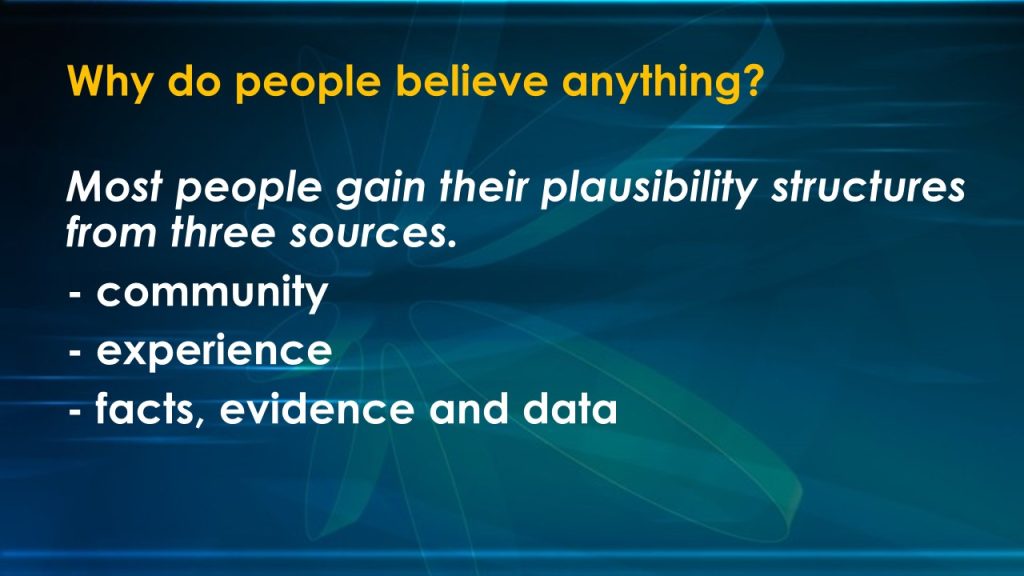
People believe things first because of their community, then because of experiences, and lastly the might consider facts and evidence.
This may seem weird because we like to think of ourselves as people who discern and are critical thinkers. But most people aren’t, not because they can’t be, it is because life does not permit due to time. People cannot review every idea and belief to see if they are plausible. I like the idea of gravity, no one here went to university to study the force of gravity so they could feel confident leaving the house without fear of floating up into outer space. Rather much of our capacity to function relies on our ability to filter out questions and lean into community and experience first.
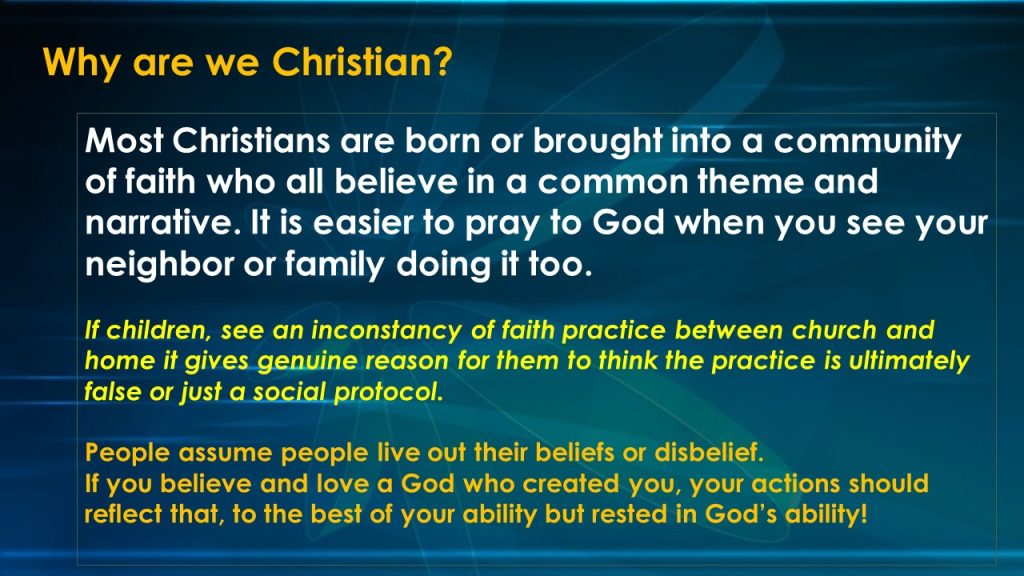
We are social creatures and our survival instincts are rooted in learning from social stimulus. This isn’t just to stay all people will go with the flock, but it is a huge factor. This factor can help people stay with the herd, or on the flip slide, if ingenuine behavior is seen, it can cause people to move from one herd to another.
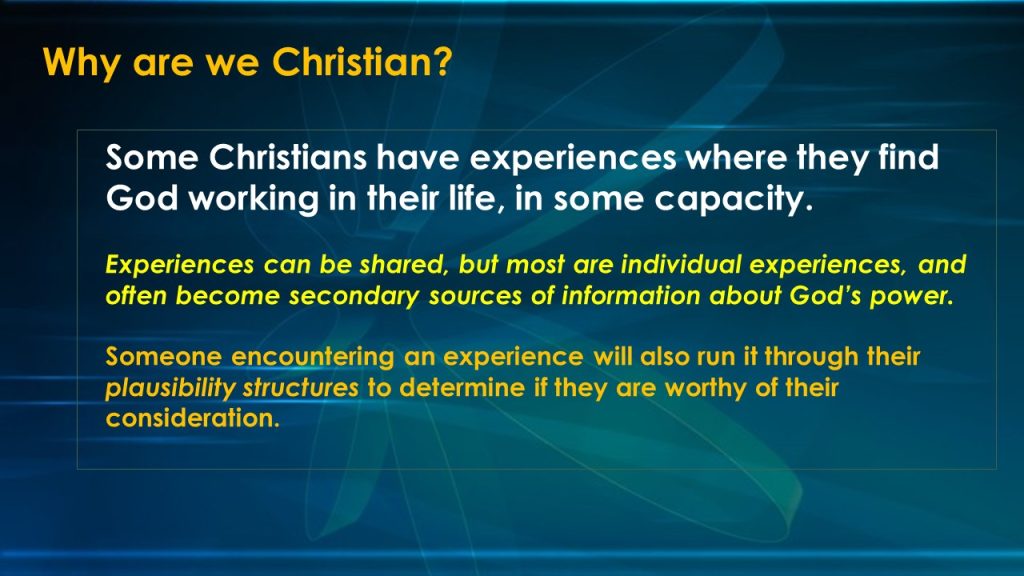
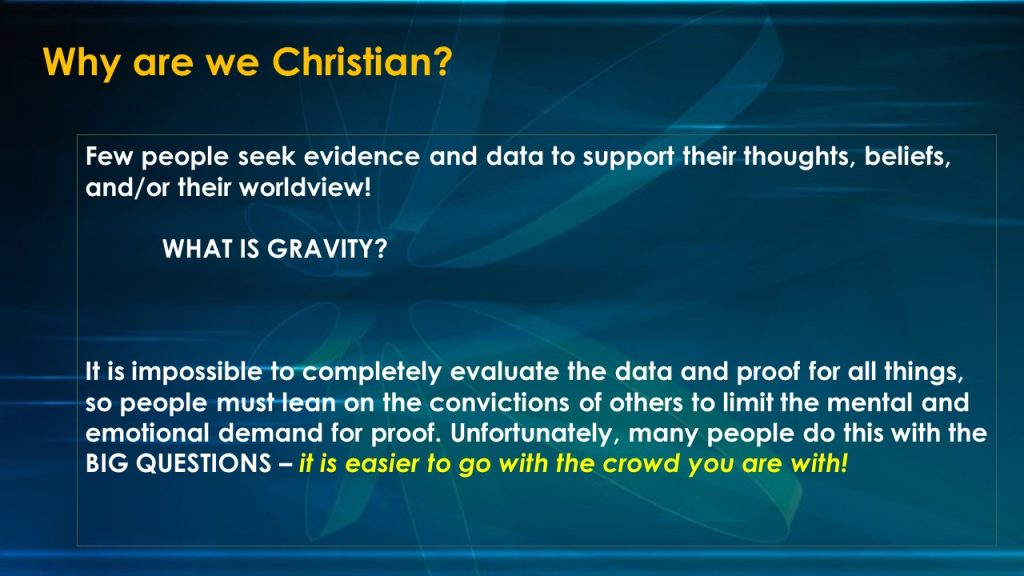
Big questions are just often avoided. Which is necessary to some extent, could you imagine running through and existential crisis every day just to get through breakfast. Not wise. Experience is great and all, but most people don’t have the time, knowledge or the community support to properly evaluate experience. So, unfortunately the necessity to survive the mystery of life and some of the big questions, leaves people settling for poor answers. And sometimes it is just easier to go with the thoughts of the crowd you are with!
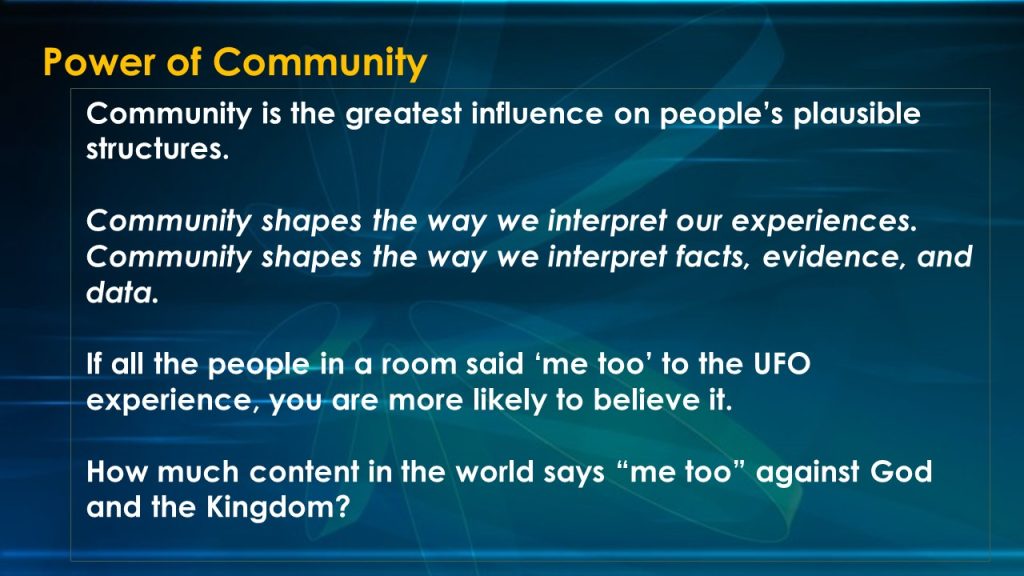
I ask this question of you, how much content (t.v., music, education, social/political/entertaining figures) say “me too” against God and the Kingdom? If all you absorb through your day seems antithetical to the Bible, God, or Faith, why would anyone give God a chance?
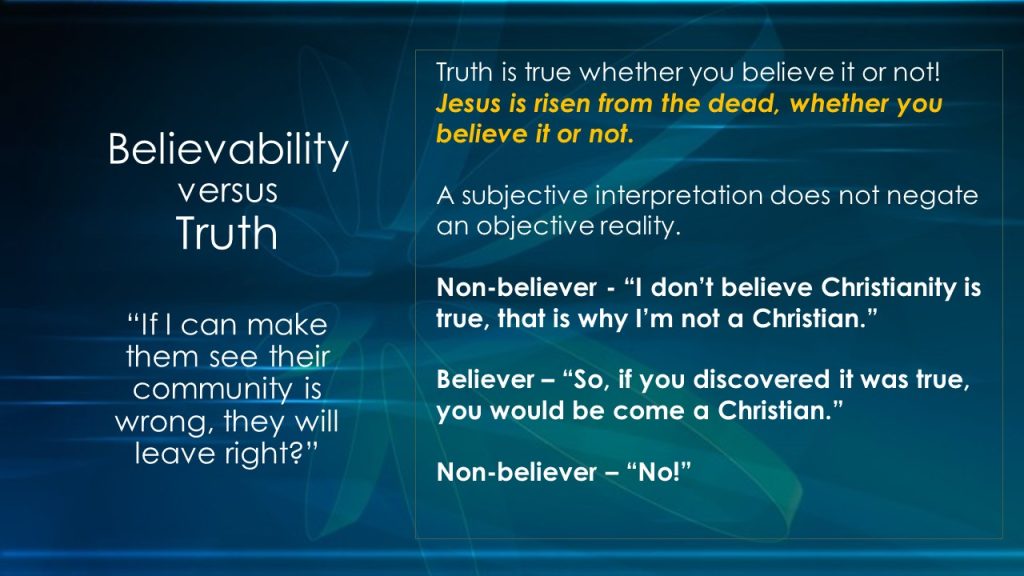
Many Christians think they can get people to jump camp by just convincing the non-believer with evidence and experiences. “If I can make them see their community is wrong, they will leave, right?”
Here is some things to about truth versus believability found in community.
Truth is true whether you believe it or not! Jesus is risen from the dead, whether you believe it or not. A subjective interpretation does not negate an objective reality. Sometimes, when we encounter a non-believer and we want to challenge an idea the wide conversation can be summaries as such.
Non-believer – “I don’t believe Christianity is true, that is why I’m not a Christian.”
Believer – “So, if you discovered it was true, you would become a Christian.”
Non-believer – “No!”
This hypothetical conversation articulates the bigger issue. People don’t want Christianity to be true because their current community people don’t want Christianity to be true. People fear what they would lose if Christianity were true. They familial, they worship and are enslaved to things that are contradictory to a faith life, and thus even if they believed it to be true, that doesn’t mean that would be Christians. There is a simple analogy to help understand this, in the Bible even the demons know Jesus is the LORD, they just choose not to worship Him.
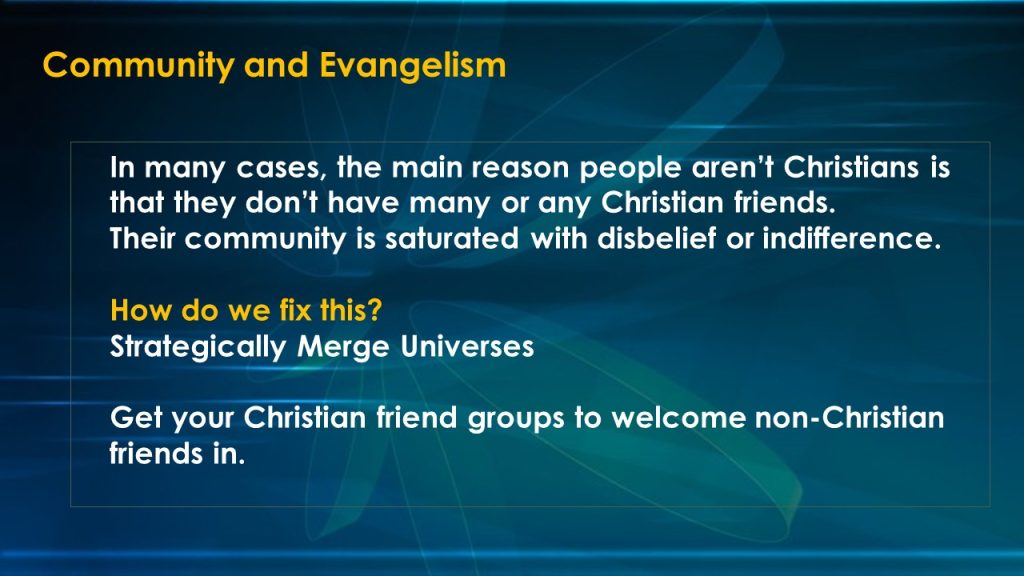
We need to be strategic in our evangelism, use what we know about human need and behavior to help people come to faith. Invite a non-believe into a group of believers. Put them in the room where the common consensus is that God is real, Jesus is savior, and the Spirit is working.
Both individuals and churches can take this initiative, how does that look?
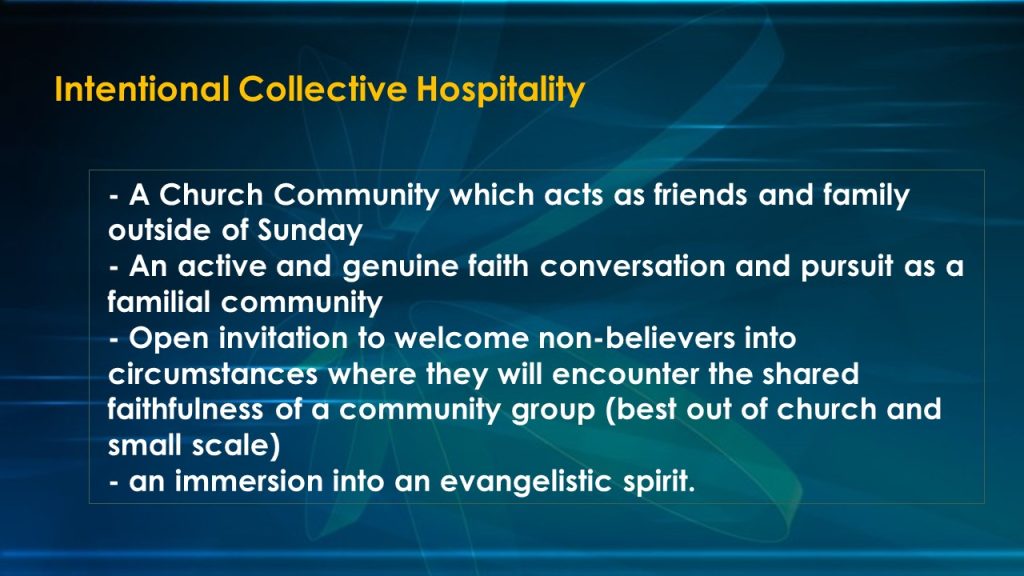
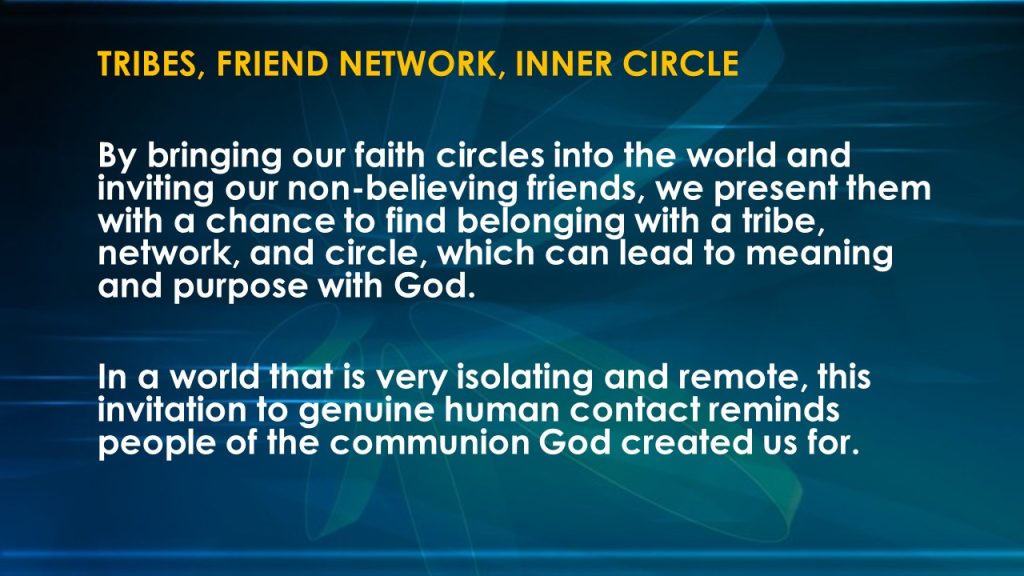
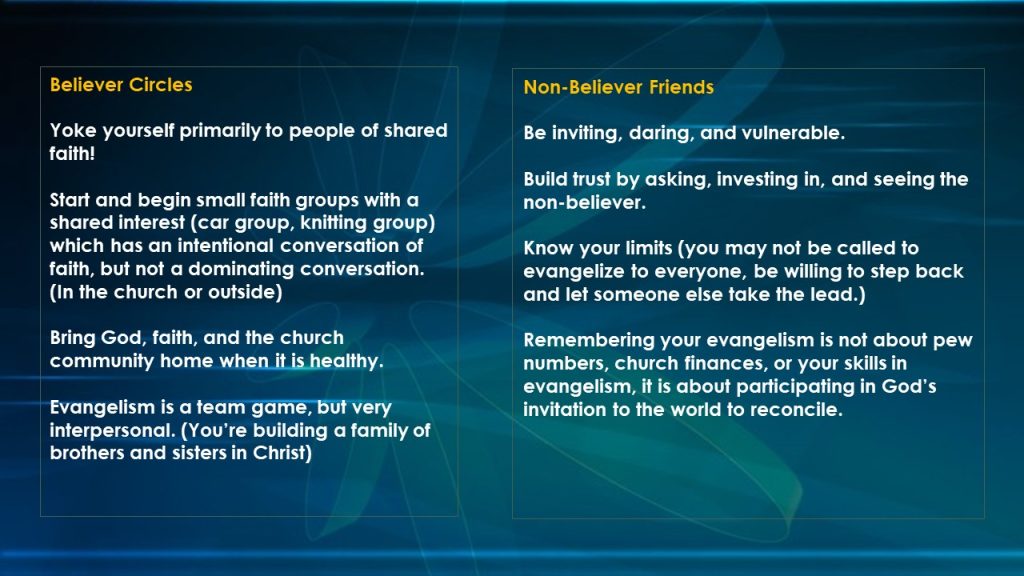
We intentionally make neutral social group activities, which are reoccurring. Not all church groups need to be sanctioned or open to everyone, it is okay to have a small circle of friend you share life with, just don’t intentionally leave anyone out, and be willing to use this group to invite non-believers in. Let the yoking of the faithful become part of your weekly life, so that when you encounter the non-believer through the week, the invitation to share in your life, becomes an invitation to share in your small circle of faithful people.
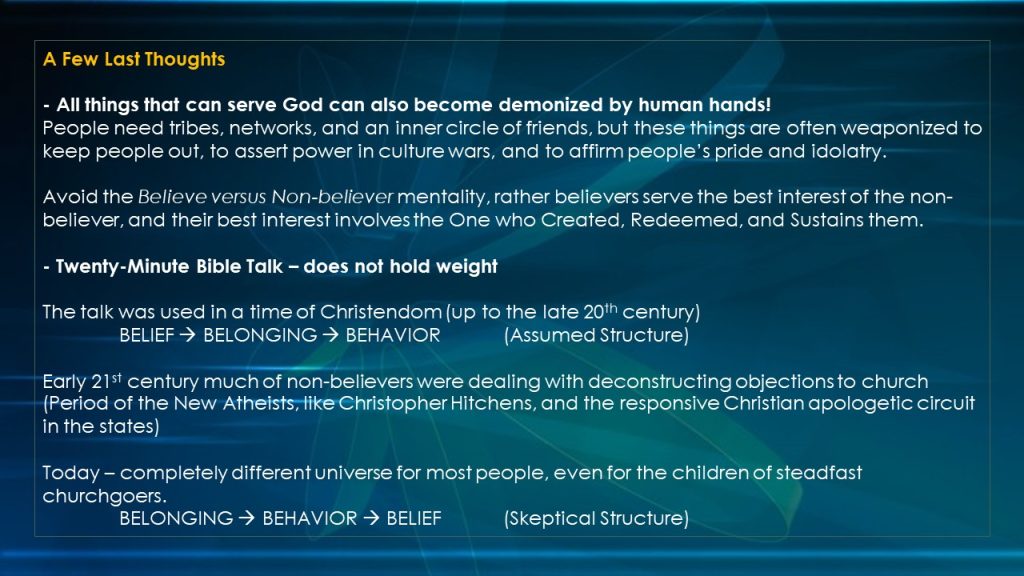
Today, coming to faith often first begins by finding a place to belong which is saturated by faithful people. This doesn’t happen on its own, faithful people need to be willing to invest into the non-believer, and invite the non-believer in. At the height of the era of Billy Graham, there was an assumed structure of evangelism, belief was more uniform in society, so the 20 minute Bible Talk could remind the people of their underlying belief, and that would give them a sense of belonging with the community of faith, and that would change their behavior back into church goers. But not people don’t have that shared belief in society, sometimes belief can be polar opposites, so now belonging needs to begin the process in many cases, the belonging adopts behaviors to be included in the community, and those feelings of belonging, and motion of behavior will stimulate a calling to belief.
Let’s wrap up with a few questions for the week…
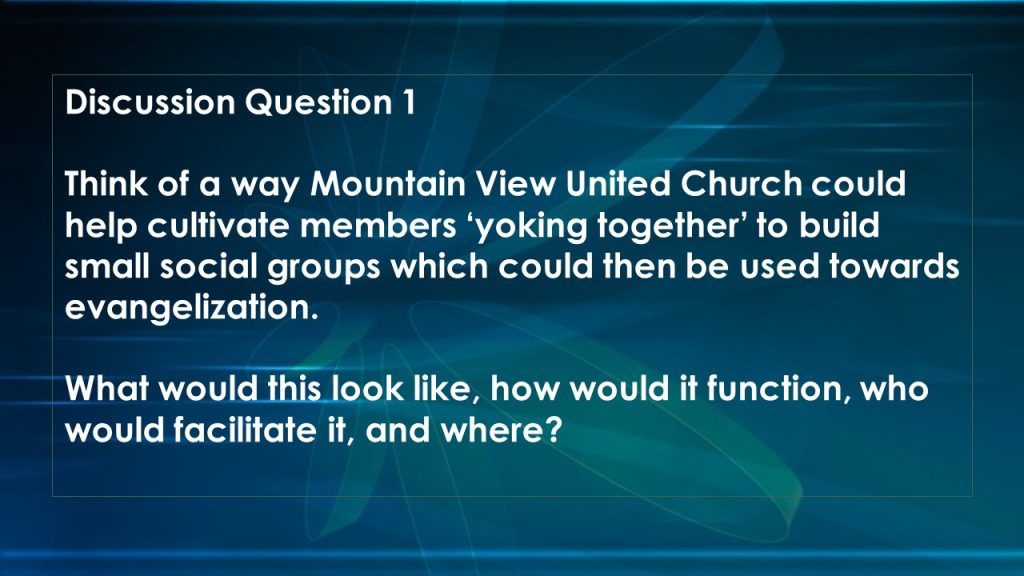
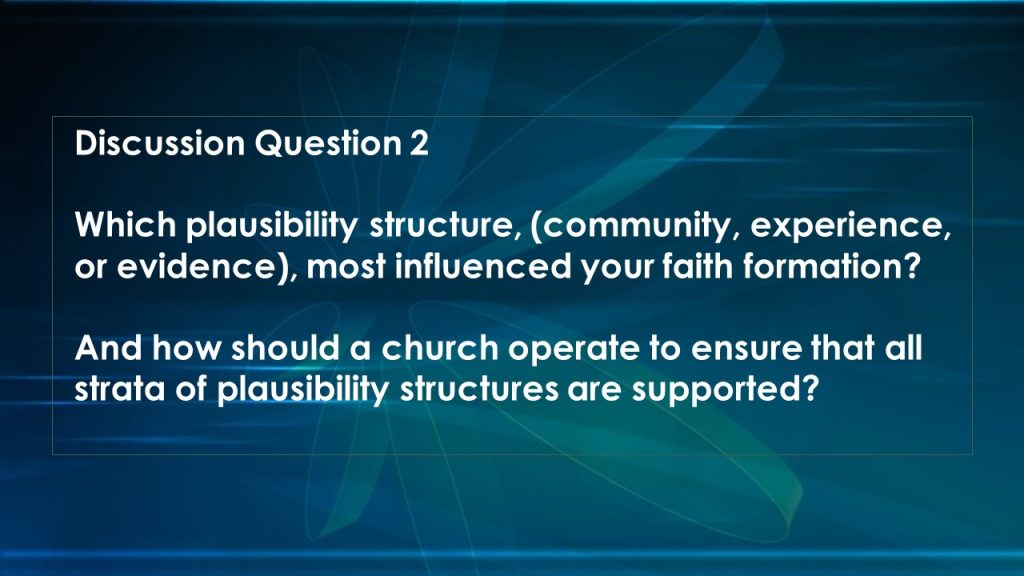
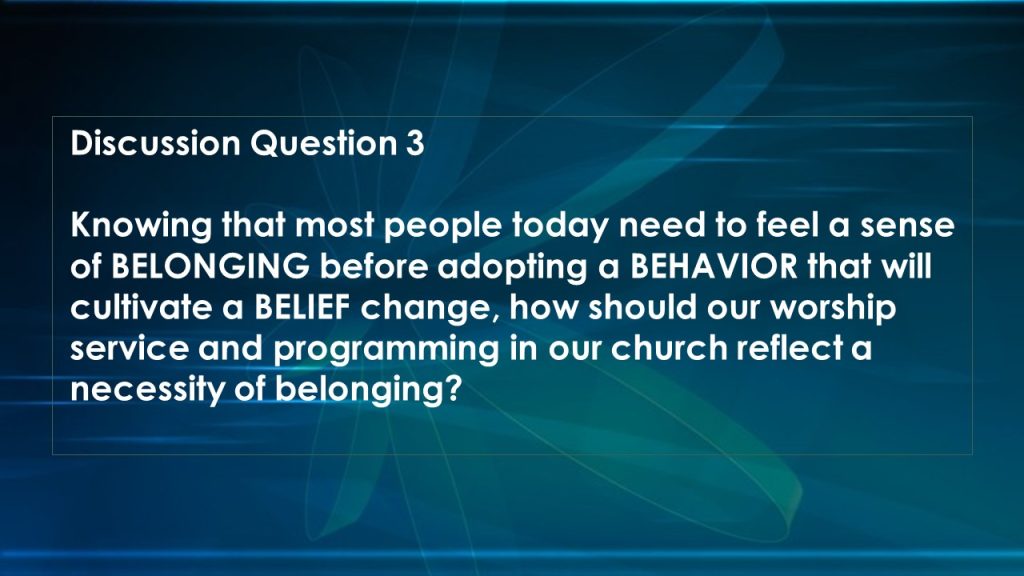
Thank you for joining us online here today to review the lecture material from February 15, for more reflection on Merging your Universes from the themes of Sam Chan’s book, please follow this link –> Here (please note that the reflection found via this link is connected with a past program held by Villages United Church in Granton ON.)
Hope to see you next week either online or in church. GOD BLESS
Leave a Reply